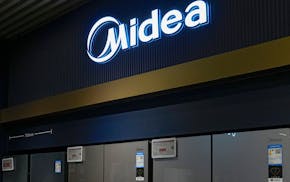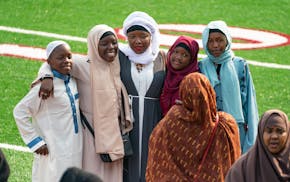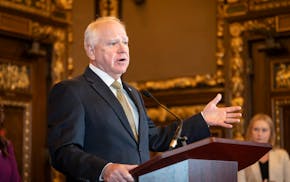Wealthy Minnesotans have opened their pocketbooks to back either former President Donald Trump or Vice President Kamala Harris, making their mark on the race for the White House.
Minnesota donors have funneled $24 million to joint fundraising committees, PACs and principal campaign committees for Harris and $7 million to Trump committees and PACs.
Joint fundraising committees function as a one-stop shop for campaigns to raise money for multiple committees at once, allowing donors to make larger contributions to help candidates.
"It's a very efficient way for them to raise money because the parties are allowed to raise hundreds of thousands of dollars a year from individual donors," said Brendan Glavin, a deputy research director at OpenSecrets, a nonpartisan group that tracks money in politics. "You go and you make one single ask, and then they can get the maximum amount."
Contribution limits to joint fundraising committees vary depending on how many participating committees are involved.
A Star Tribune analysis focused on the Harris for President and Harris Victory Fund, and for Trump, the Donald J Trump for President 2024, Inc.; Trump 47 Committee, Inc.; Trump National Committee JFC, Inc., and Trump Save America Joint Fundraising Committee.
David Schultz, a Hamline University political science professor, says the growing variety of groups tied to presidential campaigns makes it easier than ever for donors to put big money into political races. A lot of that money is hard to trace.
"It allows you to give more and at the same time have a bigger impact," Schultz said. "From the candidates' point of view, they turn it over to someone else, let them do the begging for me. For the average citizen, it is really confusing."
The Pohlads, one of Minnesota's wealthiest families, had the largest financial impact on the Harris campaign.
Robert Pohlad and his wife, Rebecca Pohlad, gave more than $1.6 million to Harris, while Pohlad brothers William and James together donated more than $556,000.
Rockefeller fortune heiress Alida Messinger, the ex-wife of former Gov. Mark Dayton, was another top-five donor who sent more than $856,000 to Harris. As was Martha Gabbert, who recently retired after running her family-owned business Room and Board. Gabbert donated more than $384,000.
Vance Opperman, who gave more than $243,000 to Harris, is backing the vice president because he said he believes Trump poses too many threats to the country.
"When you don't have a competitive political process, you get the loons in both parties, they become fringe parties," said Opperman, the owner and CEO of MSP Communications, which operates Twin Cities Business. "So to get a responsible Republican Party and return politics to a competitive process, you have to get rid of loons like Trump."
A longtime supporter of Gov. Tim Walz, Opperman said he would have supported Harris either way. Having the governor on the ticket did not influence his decision to donate, he said.
Minnesotans who gave to Trump-related groups donated much smaller amounts than those who gave to Harris.
Top GOP donors include Patrick Alexander, CEO of Coldspring Granite; Darwin Reedy, an art dealer; Apoorva Shah, CEO of animal feed additive company SAM Nutrition; Mike Lindell, MyPillow CEO; and Barbara Burwell, a philanthropist and former Miss USA.
Lindell was the only one of the top five donors who could be reached for comment. He said his $31,600 in donations were likely for GOP fundraising dinners he attended.
"I do back Donald Trump," Lindell said in a brief interview.
Another donor in the top 10, Mark Davis, the retired CEO of Davisco Foods International, also said his donations likely came from attending fundraising dinners. Davis said he typically gives directly to candidates and supports Trump.
"In spite of his presentation, he knows what he's doing," Davis said of the former president. "I just think you need someone who understands the world and I don't think the other side does."
Outside of joint fundraising committees, donors are largely limited in the amount they can donate to candidates and other groups.
Candidates can also benefit from super PACs, which are independent expenditure committees that raise large amounts of money but operate separately from candidates and their campaigns. Super PACs cannot donate directly to a candidate, but they can raise and spend an unlimited amount of money to support or oppose candidates of their choosing.
These groups increasingly appear to work closely with candidates, despite restrictions on coordination, and are often used to push big money into races in the final days before the election, Schultz said.
The bottom line is that the growing number of political groups raising and spending money during the campaign gives donors and candidates a lot more options, and voters a lot less information, Schultz said. Only a small percentage of campaign money is both limited and regulated.
"If you can't figure out how to give unlimited amounts of money, in our system, there's something wrong with you," Schultz said.
Jeff Hargarten contributed to this story.
Lawmakers strike a deal on state budget, Gov. Tim Walz calls Monday special session

Midea recalling 1.7 million of its popular air conditioners due to mold concern

Minnesota Muslims celebrate Eid al-Adha. What is the holiday?

Accomplished climber, photographer who recently moved from St. Paul missing on mountain

